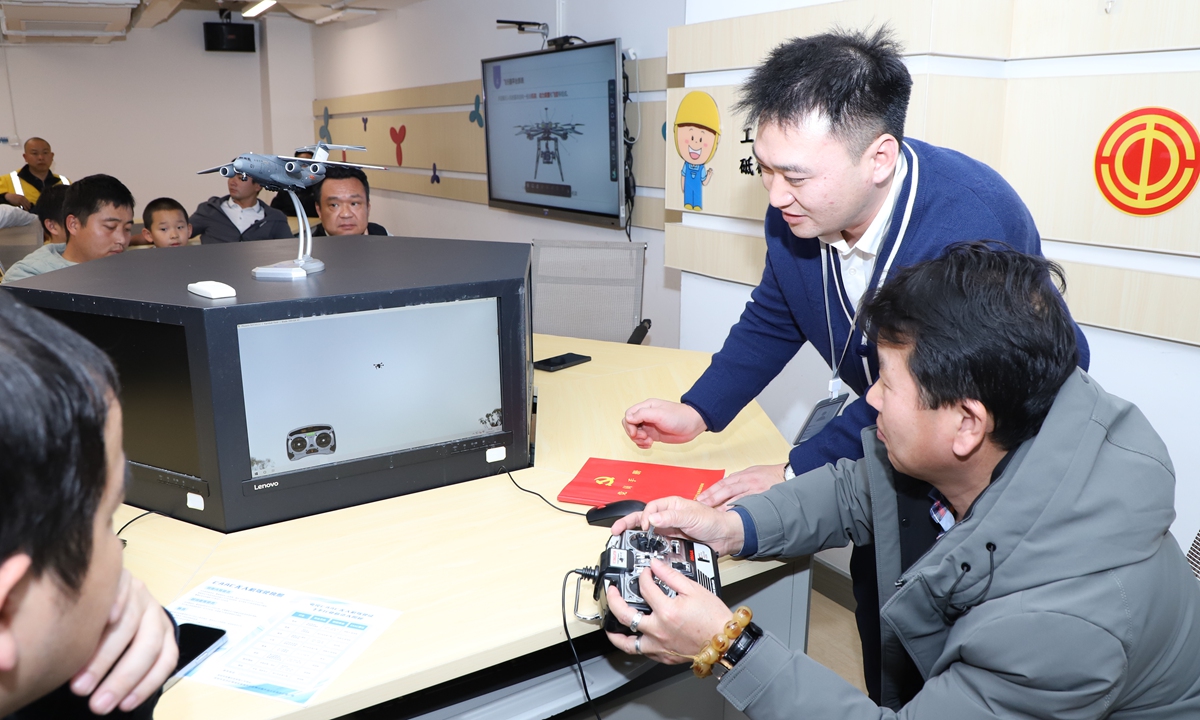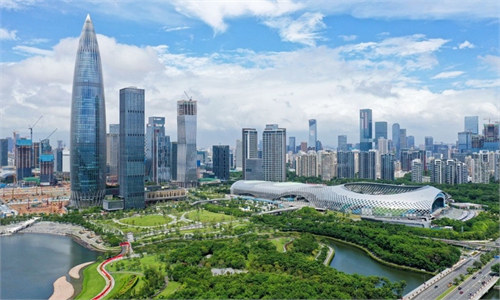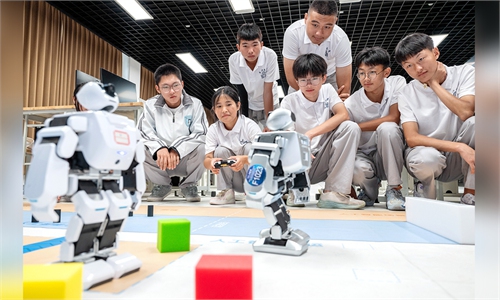ARTS / CULTURE & LEISURE
AI literacy expanding as Chinese communities offer variety of courses
Nationwide enthusiasm

Local residents have a class at the AI night school in Longhua district of Shenzhen, South China's Guangdong Province on February 21. Photo: Courtesy of the authority of the district
After finishing his last delivery of the day, Duan Zhijun arrived punctually at the designated classroom to attend the AI night school class in Longhua District of Shenzhen, South China's Guangdong Province.
Local residents in Zhangge community like Duan, a delivery worker, have got in the habit of "levelling-up their skills" at the AI night school, which the district authority offers for free, after work or school.
From tools used at workplaces to creative video production, novel writing, drone simulation flight training, smart parenting courses and intelligent human resource solutions, the AI night school offers a diverse array of classes that appeal to a wide range of participants, including public officials, students, new parents and professionals from a variety of industries.
Beyond metropolises like Shenzhen, the trend of embracing AI more efficiently is starting to reach counties and towns. AI study rooms are located in counties, typically close to schools, and enable students to engage in practice exercises and supplemental learning using AI. Some of these facilities even offer lessons on how to harness AI creatively for missions like drawing.
AI night schools and study rooms are not just about learning - they are about creating opportunities, fostering creativity and preparing communities for the technological challenges of tomorrow, according to Zhang Yi, CEO of the iiMedia Research Institute. The question now is whether this momentum can be sustained and whether the necessary safeguards will be put in place to ensure that AI education reaches its full potential.
For now, one thing is certain: the AI learning revolution in China is just getting started.
Transformational changes
Talking with the Global Times, delivery worker Duan and Gao Xuehong, who works at Foxconn and is a new mom, both said they are driven by curiosity and an understanding of the social environment around them that AI tools such as DeepSeek are transforming their life and careers.
"Sometimes, I see unmanned cars and drones delivering packages at work. It's clear that the industry is changing, and if we don't keep learning, we risk being left behind," Duan told the Global Times.
This recognition of broader trends in the workforce underscores the importance of initiatives like AI night schools. For ordinary people like Duan and Gao, these programs represent an opportunity to not only improve their skills, but also to stay relevant in an increasingly tech-driven world.
Currently pursuing an adult college degree, Gao told the Global Times that AI night school has provided her with valuable skills she had not been able to master before. The lessons cover a variety of topics, including AI-assisted writing, short video production, and tools like DeepSeek.
The AI night school is not just about individual learning, but it also fosters a sense of community. Gao has encouraged others to join in, including fellow mothers in her "mom online chat group" and colleagues.
"After discovering how useful the course is, I shared it in our moms' group chat and in a women's community group. Several moms joined and are now creating short videos and learning how to manage accounts. One mom is working hard to monetize her videos, though she hasn't succeeded yet. But she's still trying and learning," Gao said.
Hybrid models
Since the AI night school began on December 6, 2024, there have been 18 sessions with nearly a thousand participants. Among them, about 82 percent are in work, 10 percent are unemployed and around eight percent belong to the flexible employment group. This initiative has significantly supported the community in increasing income and facilitating re-employment, the Longhua District authority told the Global Times.
With help and guidance from experts and teachers from academies such as the Shenzhen Institute for Advanced Study of UESTC, Gao and Duan believe they are improving themselves, staying relevant, and adapting to the rapidly changing future through these AI courses.
Another kind of emerging AI-learning space across the country are AI study rooms. These spaces are designed to provide individuals with the resources and environment to explore AI tools and applications, making learning accessible to a wider audience.
Liu Mengxin, who runs an AI study room in Shenzhen's Guangming district, told the Global Times that to set herself apart from other AI study rooms, she not only offers courses on using AI tools for learning but also provides lessons in AI-generated art. Most of her students are in primary school.
In smaller towns and counties, AI study rooms are emerging as a hybrid model of education and childcare. For example, near Zhengtong Primary School in Yuanjiang, Hunan Province, an AI study room operates as an after-school tutoring center.
Zhang noted that AI study rooms provide opportunities for people in counties or rural areas to access AI tools, but that people should be cautious about treating them as a new form of commercial tutoring.
With AI education still in its early stages, oversight on addressing the varying quality of programs and the information gap between providers and consumers is crucial. Market regulators might step in to ensure that the nationwide enthusiasm for AI remains a positive and lasting trend, Zhang noted.



